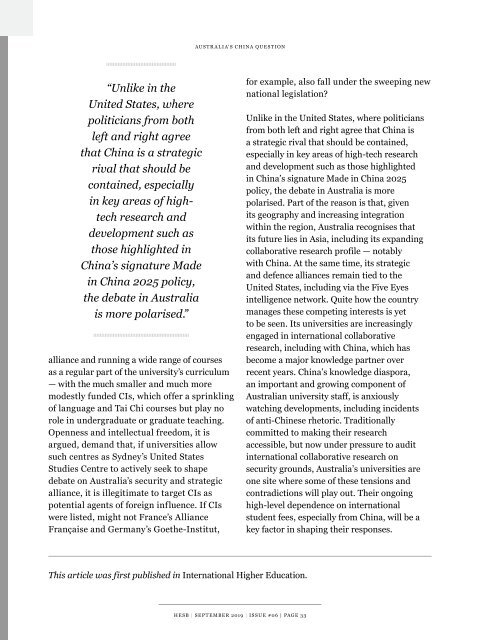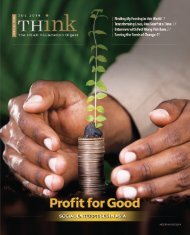Higher Education in Southeast Asia and Beyond #Issue 06
In this special issue, we feature articles arising from the 6th Global Higher Education Form 2018 (GHEF 6.0) held from 8 to 10 October 2018 in Putrajaya, Malaysia. We also look at China's influence and relationships in higher education, among other topics.
In this special issue, we feature articles arising from the 6th Global Higher Education Form 2018 (GHEF 6.0) held from 8 to 10 October 2018 in Putrajaya, Malaysia. We also look at China's influence and relationships in higher education, among other topics.
Create successful ePaper yourself
Turn your PDF publications into a flip-book with our unique Google optimized e-Paper software.
AUSTRALIA’S CHINA QUESTION<br />
“Unlike <strong>in</strong> the<br />
United States, where<br />
politicians from both<br />
left <strong>and</strong> right agree<br />
that Ch<strong>in</strong>a is a strategic<br />
rival that should be<br />
conta<strong>in</strong>ed, especially<br />
<strong>in</strong> key areas of hightech<br />
research <strong>and</strong><br />
development such as<br />
those highlighted <strong>in</strong><br />
Ch<strong>in</strong>a’s signature Made<br />
<strong>in</strong> Ch<strong>in</strong>a 2025 policy,<br />
the debate <strong>in</strong> Australia<br />
is more polarised.”<br />
alliance <strong>and</strong> runn<strong>in</strong>g a wide range of courses<br />
as a regular part of the university’s curriculum<br />
— with the much smaller <strong>and</strong> much more<br />
modestly funded CIs, which offer a spr<strong>in</strong>kl<strong>in</strong>g<br />
of language <strong>and</strong> Tai Chi courses but play no<br />
role <strong>in</strong> undergraduate or graduate teach<strong>in</strong>g.<br />
Openness <strong>and</strong> <strong>in</strong>tellectual freedom, it is<br />
argued, dem<strong>and</strong> that, if universities allow<br />
such centres as Sydney’s United States<br />
Studies Centre to actively seek to shape<br />
debate on Australia’s security <strong>and</strong> strategic<br />
alliance, it is illegitimate to target CIs as<br />
potential agents of foreign <strong>in</strong>fluence. If CIs<br />
were listed, might not France’s Alliance<br />
Française <strong>and</strong> Germany’s Goethe-Institut,<br />
for example, also fall under the sweep<strong>in</strong>g new<br />
national legislation?<br />
Unlike <strong>in</strong> the United States, where politicians<br />
from both left <strong>and</strong> right agree that Ch<strong>in</strong>a is<br />
a strategic rival that should be conta<strong>in</strong>ed,<br />
especially <strong>in</strong> key areas of high-tech research<br />
<strong>and</strong> development such as those highlighted<br />
<strong>in</strong> Ch<strong>in</strong>a’s signature Made <strong>in</strong> Ch<strong>in</strong>a 2025<br />
policy, the debate <strong>in</strong> Australia is more<br />
polarised. Part of the reason is that, given<br />
its geography <strong>and</strong> <strong>in</strong>creas<strong>in</strong>g <strong>in</strong>tegration<br />
with<strong>in</strong> the region, Australia recognises that<br />
its future lies <strong>in</strong> <strong>Asia</strong>, <strong>in</strong>clud<strong>in</strong>g its exp<strong>and</strong><strong>in</strong>g<br />
collaborative research profile — notably<br />
with Ch<strong>in</strong>a. At the same time, its strategic<br />
<strong>and</strong> defence alliances rema<strong>in</strong> tied to the<br />
United States, <strong>in</strong>clud<strong>in</strong>g via the Five Eyes<br />
<strong>in</strong>telligence network. Quite how the country<br />
manages these compet<strong>in</strong>g <strong>in</strong>terests is yet<br />
to be seen. Its universities are <strong>in</strong>creas<strong>in</strong>gly<br />
engaged <strong>in</strong> <strong>in</strong>ternational collaborative<br />
research, <strong>in</strong>clud<strong>in</strong>g with Ch<strong>in</strong>a, which has<br />
become a major knowledge partner over<br />
recent years. Ch<strong>in</strong>a’s knowledge diaspora,<br />
an important <strong>and</strong> grow<strong>in</strong>g component of<br />
Australian university staff, is anxiously<br />
watch<strong>in</strong>g developments, <strong>in</strong>clud<strong>in</strong>g <strong>in</strong>cidents<br />
of anti-Ch<strong>in</strong>ese rhetoric. Traditionally<br />
committed to mak<strong>in</strong>g their research<br />
accessible, but now under pressure to audit<br />
<strong>in</strong>ternational collaborative research on<br />
security grounds, Australia’s universities are<br />
one site where some of these tensions <strong>and</strong><br />
contradictions will play out. Their ongo<strong>in</strong>g<br />
high-level dependence on <strong>in</strong>ternational<br />
student fees, especially from Ch<strong>in</strong>a, will be a<br />
key factor <strong>in</strong> shap<strong>in</strong>g their responses.<br />
This article was first published <strong>in</strong> International <strong>Higher</strong> <strong>Education</strong>.<br />
HESB | SEPTEMBER 2019 | ISSUE #<strong>06</strong> | PAGE 33





